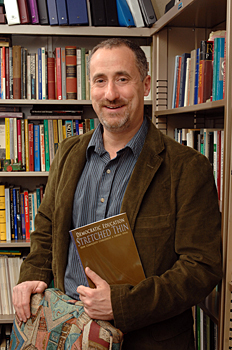“And what we find when people think for themselves, especially in a pluralistic society like our own, is that their thinking goes off in divergent directions. People differ in their answers to important questions and even about what are the important questions in the first place. The problem is when powerful interests hold enough sway to eradicate this diversity by reducing everything to their own image and making everything over in that image. These days much of life
is dominated by money and business--a sort of corporatizing of everything,” Blacker explained. “Something is lost to us when this happens--when everything is reduced to the bottom line. This can be true in education. The book presents the argument about why this reductionism is a problem and tries to envision an antidote.
“The answer isn't just a simple rejection of money and business but an attempt to imagine a society where everything is not dominated by one concern. There have been times in history when nations have been dominated by religious or political ideologies, but currently the overriding concern is money,” Blacker said.
“Around us currently in higher education, for example, we celebrate research grants that bring in money, and everyone loves money, but that's not really what is at the heart of our enterprise. With the best intentions we proceed down a primrose path where even though our bank accounts look good, we may forget our identity as specifically educational institutions, not just adjunct subsidiaries of corporate America. When we talk about education in strictly economic terms it excludes other discussions we ought to be having. We need a new language to articulate why we care about education that reflects a range of all the things we care about. The book aims to articulate a view of social justice that takes the complexity of our lives and all that we value into account.”
This doesn't mean education should be discussed in an “anything goes” context, Blacker said. After taking complexity as a starting point, general cultural and political traditions like civi liberties and civil rights need to be part of the conversation. “The book advocates working within the country's traditions when trying to build a new dialogue,” he said.
Another way education is narrowly focused, Blacker said, is through an overuse of standardized testing.
“Our bottom-line accounting systems that stress performance on standardized tests are a reflection of this type of narrowness. It is a symptom of the driving force of business interests in education,” he said. “There is nothing wrong with accountability as such. In fact, my argument about educational accountability is that there is actually too little of it when it is conceived as narrowly as it is in laws such as the federal No Child Left Behind Act. Should education be responsible only to corporate America? Should schools define their value exclusively in economic terms? Is the only answer to the question, 'Why should we care about our schools?' 'to prepare individuals for the corporate market place so our economy won't suffer?' That answer isn't necessarily wrong; it's just too narrow and incomplete. It artificially excludes many of the things we care about.”
For example, Blacker asked, why do we care about sports in education? Is it because some students will go on to be great athletes, is it because we care about winning or is it about more immeasurable character issues like fostering teamwork and sportsmanship; things that cannot be measured on standardized tests?
“If we start with complexity, as opposed to any one value, we can develop a better system of accountability. It would help us recognize problems in schools like Columbine where the test scores may have been good,” he explained.
“We need to recognize more forthrightly curriculum that may not have a direct economic value, like music and art education, subjects that can be valued for their own sake--for what they bring to human life,” he said.
Blacker also suggested that schools need to teach students more about religion. Although he cautions that schools should not proselytize on behalf of any one religion, or even religion in general, he said schools need to teach students more about many religions to help them think more about life's deeper questions.
“We talk all the time about multiculturalism,” he said, “but at the same time government restraints keep us from teaching about, say, Islam, which is obviously at the core of some cultures. We need to conceive ways we can make these connections without running afoul of constitutional constraints.”
“Democratic education requires citizens to experience doubt about their basic ideas instead of mouthing platitudes,” he said. “People should do so reflectively, embracing a value reflectively. It can be uncomfortable, but it's good to go through periods of doubt about the big issues like God, freedom, the point of it all. People need to know what they are about when they are pushed to the wall. I want us to embrace this deep thinking more strongly than we do and so I want more from our educational system than we are currently asking of it. However, we should make not just more demands but better ones. The tough part, the philosophical part, is that making better demands require us to think much more seriously about who we are and what we value.”
Blacker earned his doctorate from the University of Illinois at Urbana-Champaign in 1994 and has been at UD since 1998. He also taught at Illinois State University and Teachers College at Columbia University. His research interests are the philosophy of education and education policy. His first book, Dying to Teach: The Educator's Search for Immortality, was published by Teachers College Press in1997. He also has published close to 40 articles and book chapters.
Article by Beth Thomas
Photo by Kathy Atkinson



